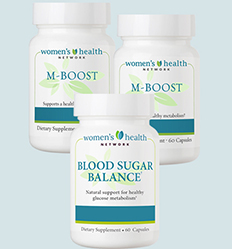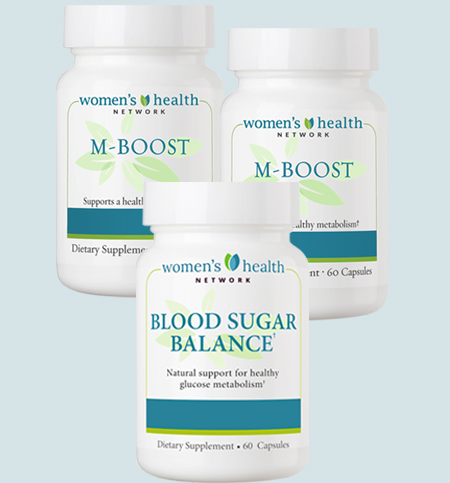Authored by Dr. Sharon Stills, NMD
Menopause is a natural part of a woman’s life, but it’s one that can still come with some unwelcome surprises. These can come in the form of symptoms ranging from hot flashes, low libido and vaginal dryness to weight gain, brain fog and mood swings.
For many women, the transition through perimenopause and menopause is no walk in the park, especially when symptoms are severe or show up all at once. But there’s some good new in all of this. Nature provides a wide array of vitamins, nutrients and medicinal plants and herbs that help to significantly relieve menopause symptoms.
The “natural approach” to menopause symptom relief works in a completely different way than many conventional medical solutions like synthetic hormone replacement and synthetic drugs. Vitamins and herbs work with your body to rebalance your hormones and support your overall health. So natural supplements for perimenopause and menopause can actually prevent or reduce the severity of nearly all of your symptoms rather than just masking them temporarily.
Natural supplements and vitamins for menopause
In our experience, women are often not aware of the power that vitamins, plants and herbal remedies have to prevent symptoms. In many cases, their strength comes from adaptogenic effects. Certain plants and herbs can adapt to the needs of your body because they share specific molecular features with your own hormones. This can encourage hormone production, slow it down or even mimic your own hormones depending on your body’s unique needs.
Here is a list of the best herbs and supplements for menopause symptoms, plus the evidence behind their effectiveness and relevant safety information.
Black cohosh
Black cohosh is a plant native to North America that has been used for centuries as a traditional remedy for menopause symptoms and other women’s hormonal health issues. The herb has been studied and there is a growing body of research that black cohosh helps to reduce symptoms of menopause, including night sweats and flashes. As one of the best natural mood enhancers for menopause, the herb helps with menopause depression and mood by boosting your serotonin levels. The herb can be taken alone or as part of a multi-herb formula. At higher dosages, side effects may include headaches and GI issues.
Omega 3s
New research shows that Omega-3 fatty acids help to ease psychological distress and depressive symptoms often suffered by menopausal and perimenopausal women. Taking a high quality Omega-3 supplement also helps to reduce joint pain and protect women’s heart and bone health.
Magnesium
Magnesium eases anxiety and sleep disturbances related to hormonal imbalances in perimenopause and menopause. It also helps to improve heart health and reduce blood pressure, combat osteoporosis and, particularly if you take magnesium glycinate, help with constipation. Most women don’t get enough magnesium in their diets so taking a magnesium supplement is often key for symptom relief.
Magnolia bark
Magnolia bark is a powerful supplement for menopause prepared from the bark, leaves and flowers of the houpo magnolia tree. Used for thousands of years in traditional Chinese medicine, current research has found that magnolia bark is effective for helping to stop hot flashes, insomnia, anxiety, depression, irritability, vaginal dryness and loss of libido during menopause.
Red clover: natural hormone replacement
Red clover is a natural hormone replacement that acts like weak estrogens in your body. Because they complement your own, more potent estrogens, they can help even out erratic levels of both high and low estrogen. According to a study published in Obstetrics and Gynecology International, red clover also helps with other menopause-related symptoms like low libido, anxiety/depression, sleep troubles and fatigue. And there’s more scientific good news: red clover’s compounds relieve PMS and improve both women’s heart health and the appearance of skin and hair as we age.
Wild yam for menopause
Wild yam extract is naturally rich in diosgenin, a plant compound structurally bioidentical to progesterone found in the body. Bringing progesterone levels back in balance will help to offset estrogen dominance and its related symptoms, including hot flashes and low libido. Wild yam extract may be especially helpful for hair loss in perimenopause and menopause.
Chastetree berry
Chastetree berry (Vitex agnus-castus) helps restore your natural ovulation and progesterone production until your body is finally ready to stop cycling altogether. If you’re experiencing cramping, breast tenderness, food cravings and bloating, it’s often an indication that your progesterone levels are falling while estrogen is staying high. Because chasetree berry helps to gently raise your progesterone levels, it can bring these hormones back into balance and reduce symptoms.
Ashwagandha: for stress and anxiety in menopause
Hormonal changes in menopause can make whatever stress you have feel that much bigger by exacerbating the physical effects of stress on your body. Suddenly you have less energy, more anxiety, mood swings and maybe even depression.
Ashwagandha is one of the best herbs for stress and anxiety in menopause. It ranks high among natural mood enhancers for menopause because the herb is an adaptogen — another ‘normalizer’ — which makes it a great tonic for the adrenal glands. Ashwagandha can also boost a sluggish thyroid, and it counteracts depression and makes your brain function better, especially for memory issues due to stress.
Passionflower
Used by traditional cultures to treat symptoms like irritability, anxiety and insomnia, passion flower contains natural monamine oxidase inhibitors (MAOIs), which are known to have antidepressant and anti-anxiety properties. Passionflower also helps to increase levels of gamma-aminobutyric acid (GABA), a chemical in the brain that induces relaxation and reduces anxiety. A study entitled “Passionflower in the treatment of generalized anxiety: a pilot double-blind randomized controlled trial with oxazepam,” published in the October 2001 “Journal of Clinical Pharmacy and Therapeutics” found that passionflower was as effective as oxazepam at treating generalized anxiety disorder and had fewer side effects.
Phytoestrogens fight hot flashes
Many fruits and vegetables are also supercharged with “phytoestrogens” that are particularly beneficial to women struggling with hot flashes and other menopause symtoms. Phytoestrogens include isoflavones and lignans, two compounds that work gently with your body to recalibrate hormonal balance at the cellular level.
Soybeans and foods made from soy — like tofu — are phytoestrogen-rich because they contain isoflavones. Flax seeds are another great choice because they’re high in lignans. Grind up 1–3 tablespoons of flax seeds every day and add them to soups, salads and smoothies. You also get phytoestrogens in parsley, fennel, celery, garlic, onions, and all sorts of seeds, nuts and legumes.
Ginseng
Stress makes menopause symptoms worse — and this is where ginseng comes in. Siberian ginseng — also called “eleuthoro” — acts to limit excess stress-induced high cortisol levels in your system by inhibiting the cortisol-boosting enzyme C-Jun N-terminal kinase. Through this action, ginseng helps to protect your body from stress, which in turn diminishes fatigue, improves stamina and helps to regulate blood sugar.
Dong quai for menstrual symptom relief
Originally used in China, dong quai (Angelica sinensis) was introduced to Western medicine in 1899 and has been used ever since for treating hormonal disorders, especially those related to menstruation. Dong quai has been shown to help relieve menstrual cramps and other symptoms like hormonal headache, insomnia and moodiness. Among natural practitioners, dong quai is thought to be more effective when used in combination with black cohosh.
Herbal Equilibrium
Our exclusive multi-herbal formula helps to actively balance all three problem hormones — estrogen, progesterone and testosterone — for total symptom relief. Designed by doctors, Herbal Equilibrium contains a proprietary blend of passionflower, chasteberry, wild yam and ashwaganda for effective adaptogenic support. Additionally, Herbal Equilibrium contains black cohosh, red clover and kudzu, three herbs that form a powerful and synergistic isoflavone-glycoside complex that diminishes symptoms associated with estrogen deficiency like hot flashes and night sweats.
Menopause Weight Loss Combo
During perimenopause and menopause, women tend to gain more midsection fat and have a harder time losing weight. This is due to hormonal fluctuations that: 1. increase fat deposition around the midsection (aka belly fat) and 2. slow down metabolism. This double trouble is why your old diet tricks don’t work. Until you address underlying hormonal imbalances, extra pounds are going to stay stuck. So that’s why we’ve combined Herbal Equilibrium, for menopause symptom relief and hormonal balance, and M-Boost, our metabolic formula for weight loss, cravings and metabolism support, into an easy to take Menopause Weight Loss Combo. Weight gain in perimenopause and menopause is different and our support gives you the tool to finally shed this stubborn weight.
Get the most out of your supplements
Herbs and other natural menopause supplements work best when you take them regularly over time. Most herbs work by nourishing and rebuilding, which means they need some time to work their magic.
Also keep in mind that supplements are most effective when accompanied by other positive lifestyle choices. So, please, take care of your health in other ways as well, especially a healthy diet, getting to bed at a decent hour and managing that stress level in whatever ways work best for you — in menopause and beyond.












